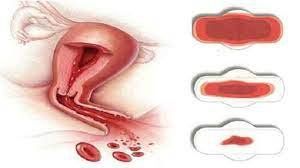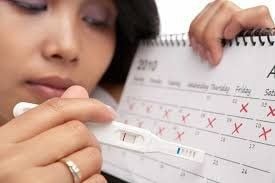This is an automatically translated article.
Hypermenorrhoea is a heavy or prolonged menstrual period that affects your daily life. If hypermenorrhoea occurs at the age of 50, this is an unusual condition. You need to see a doctor right away for advice, early diagnosis and treatment.1. What is amenorrhea?
Menstrual cramps in women are heavy or prolonged menstrual periods. 1 in 3 women describe heavy bleeding, 1 in 20 women consult a doctor about this change to their cycle each year .Hypermenorrhea is blood loss over a period of more than 80 ml or a period lasting more than a week. Although this is different for every woman, you may have hypermenorrhea if:
Change tampons more often than usual Need larger pads Have blood clots larger than 2.5 cm Sleep your sleep is disrupted during your period or bleeding through your clothes and bedding
The best way to determine if you have heavy bleeding is to consider how your cycle affects daily life yours. Menstruation can make you tired and put you at high risk for anemia, which can lead to dizziness, irregular heartbeat, and shortness of breath. Irregular flow can also disrupt your daily activities due to cramping, fatigue, and having to change tampons or pads more often.
2. Is menopause after 50 years normal?
Hypermenorrhea often occurs in women transitioning to menopause, when your body's reproductive system stops releasing eggs. One study found that among women aged 42 to 52 years, more than 90% experienced periods lasting 10 days or more - with 78% saying their blood volume was heavy.This is because when a woman reaches menopause, there are fewer eggs to mature in the ovaries. The body secretes higher amounts of follicle-stimulating hormone (FSH) to try to maintain normal ovulation, which produces more estrogen.
This higher level of estrogen thickens the lining of the uterus, often resulting in heavier and longer menstrual periods. The time it takes for a woman's body to complete this cycle can also lengthen, leading to longer periods between periods and more blood flow.
This change in reproductive hormone levels is known as perimenopause which usually begins about 4 years before a woman has her last period. But the transition can start as early as 10 years before menopause.

Nếu cường kinh ở tuổi 50 xảy ra thì đây là một tình trạng bất thường
3. Changes in perimenopause
Over time, a woman's estrogen levels decrease, thinning the lining of the uterus. The cycles happen less often until they stop completely.But as hormones still change during perimenopause, women often experience dramatic changes to their menstrual cycle. This may include:
Shorter, longer cycles or no periods
Hormonal changes during perimenopause are caused by a decrease in the number of eggs in the ovaries. This can lead to longer periods between cycles - at least 38 days apart - or complete absence of periods. Women with lower estrogen levels may experience shorter-than-normal cycles.
Spotting between periods
A change in the time between periods can also cause bleeding between periods. The thickening of the uterine wall often causes spots that are red, brown, or dark in color.
Irregular menstrual bleeding
As higher estrogen levels thicken the lining of the uterus, it may become heavier as it sheds. Irregular changes in your menstrual cycle such as missed or irregular periods can also cause more bleeding.
Other physical and mental symptoms can also accompany perimenopause, including:
Hot flashes and trouble sleeping Mood changes and irritability Changes to sexual activity Increased risk of infection vagina, bladder problems, osteoporosis and heart disease
4. How to treat hypermenorrhea at the age of 50
While normal, hypermenorrhea can disrupt many women's daily lives.Research shows that ibuprofen can help reduce bleeding time by 20 to 40% and relieve symptoms like cramps. Paying attention to your diet and lifestyle can also help manage perimenopause symptoms, including:
Managing stress levels and healthy sleep to avoid greater hormone imbalances
Supplements iron for the body to prevent anemia - which causes symptoms like fatigue and can contribute to heavier bleeding
Track your menstrual cycle to better control heavy bleeding more
Use pads or tampons that provide comfort when flowing with a lot of water and prevent leakage

Cường kinh ở tuổi 50 gây ảnh hưởng tới cuộc sống thì bạn nên gặp bác sĩ để được tư vấn
5. When should you see a doctor?
Heavy periods and irregular periods are common in women over 50. But if your symptoms are affecting your life and health, you should contact your doctor. You may be a good candidate for hormone therapy to help balance estrogen and progesterone levels and reduce hypermenorrhea and other perimenopausal symptoms.Bleeding can occur in women over the age of 50 after they reach menopause. Studies show that this bleeding after menopause is often caused by conditions such as uterine fibroids or polyps. It can also be a sign of endometrial cancer, which affects 2 to 3% of women and is most common in postmenopausal women.
Hypermenorrhea can also be a symptom of another underlying health condition. Make sure to monitor your flow and see a doctor if you experience:
Heavy bleeding - like soaking through cleaning products for hours Consistent spotting between cycles Several consecutive cycles shorter than 21 days or a few days longer than usual More than three months between periods Bleeding after sex Menstruation can be a sign of many dangerous conditions, so when you experience this, you should see a doctor and Timely treatment according to the doctor's instructions to avoid affecting fertility.
In order to help customers detect and treat gynecological diseases early, Vinmec International General Hospital has a package of basic gynecological examination and screening, helping customers detect early infectious diseases and help treat Easy, inexpensive treatment. Screening detects gynecological cancer (cervical cancer) early even when there are no symptoms.
Basic gynecological examination and screening package for female customers, has no age limit and may have the following symptoms:
Abnormal vaginal bleeding Having menstrual problems: Irregularly prolonged cycle, irregular menstrual period Abnormal vaginal discharge (smell, different color) Vaginal pain and itching Female clients have several risk factors such as poor personal hygiene, Unsafe sex, abortion,... Female customers have other symptoms such as: Abnormal vaginal discharge, itching, pain in the private area, abnormal vaginal bleeding.
Please dial HOTLINE for more information or register for an appointment HERE. Download MyVinmec app to make appointments faster and to manage your bookings easily.













